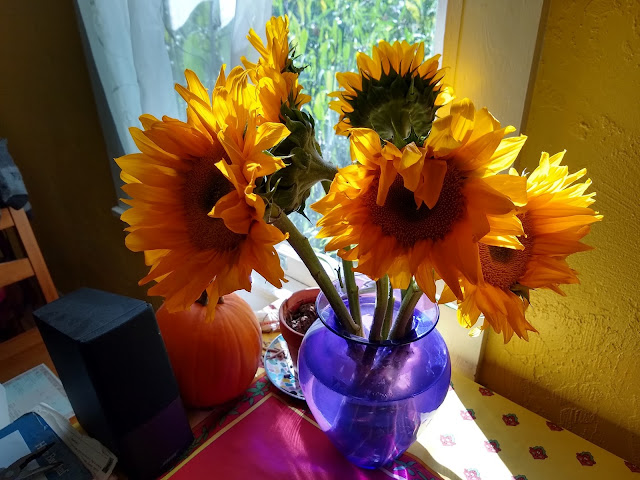Cacti planted on the grounds of Hotel Playa de Cortes, Guaymas, Sonora, MX
"In Recollections of My Life as a Woman, the poet Diane di Prima tells of a night at Allen Ginsberg’s place in New York. She’d gotten a friend to babysit her young daughter and headed over to Ginsberg’s apartment because Jack Kerouac and Philip Whalen were in town for “one of those nights with lots of important intense talk about writing you don’t remember later.”
Well, Diane had promised her babysitter that she’d be back at 11:30 that night, and 11:30 starts rolling around, so Diane bids her farewells. “Whereupon, Kerouac raised himself up on one elbow on the linoleum and announced in a stentorian voice: ‘DI PRIMA, UNLESS YOU FORGET ABOUT YOUR BABYSITTER, YOU’RE NEVER GOING TO BE A WRITER.’”
How do you like that?
Kerouac just props himself up with one arm and drunkenly slaps us with the great fear we all share. He embodies the archetype of the selfish, self-destructive male artist, and he announces that unless we, too, are willing to be irresponsible to our relationships, we’ll never quite measure up.
“I considered this carefully, then and later,” Di Prima writes, “and allowed that at least part of me thought he was right. But nevertheless I got up and went home.”
Three cheers for di Prima!
“I’d given my word to my friend,” she explains, “and I would keep it. Maybe I was never going to be a writer, but I had to risk it. That was the risk that was hidden (like a Chinese puzzle) inside the other risk of: can I be a single mom and be a poet?”
A serious question, that one. Serious not only for moms but for all of us. Can we be present in our relationships and still do the work we feel called to do? It’s like my friend Lynn says: “A woman has to make a real effort not to dissolve into everything that needs her.” Our relationships need us, but we don’t want to dissolve. We refuse to dissolve, but we choose also to be responsible to our relationships. We’re tired of the drunk guy on the linoleum telling us we can’t do both. Women have always done both.
Looking back, di Prima recognizes what is true: Had she opted to stay that night, “there would be no poems. That is, the person who would have left a friend hanging who had done her a favor, also wouldn’t have stuck through thick and thin to the business of making poems. It is the same discipline throughout.”
The same discipline.
And discipline, like motherhood, is good for the soul. Poetry is good for the soul. Responsibility to all our dysfunctional relationships is good for the soul. The archetype of the selfish male artist tells us that we can’t manage all these things at once, that we can’t be simultaneously responsible to children, babysitters, self, and art, that we have to sacrifice, to abandon – but we know that’s a lie.
As I write this, Kerouac has been in his grave for nearly forty years. Diane di Prima is down in San Francisco, mother of five children, author of thirty-five books of poetry and several memoirs, powerhouse, and twenty-first-century radical. (Editor's note: not as of a couple of days ago, may she rest in peace).
We don’t need children to be happy, but motherhood has taught me this: to experience joy, we have to be able to honestly experience darkness, too. In responsibility to relationship, we build bodies of memory and life experience that we can be proud of. Motherhood has taught me that the opposite of happiness isn’t struggle. It isn’t even depression. The opposite of happiness is fear and obedience.
In Revolutionary Letters, di Prima writes, “Be strong. We have the right to make the universe we dream. No need to fear ‘science’ groveling apology for things as they are, ALL POWER TO JOY, which will remake the world.”
Three cheers for di Prima, for motherhood, for the courage to make the universe we dream."
- Ariel Gore, Bluebird: Women and the New Psychology of Happiness
"The opposite of happiness is fear and obedience."
The bothness of what has always been asked of women and rarely been asked of men is truly remarkable. Something weirdly flashed into my mind when I was reading this, which was the plot line of It's a Wonderful Life, where the tension between George Bailey's dreams and his obligations is portrayed as a great recurring tragedy in his life. Yes, the big payoff at the end is the message that, in fact, his ordinary life is "wonderful." But it seems we could use many more stories of women making these incredibly tough decisions, however they choose to make them.
The patriarchy guarantees that every decision a woman makes is a mistake. That's part of the goalpost moving that enforces male privilege. Having children is a mistake, not having them is a mistake, being a writer is a mistake, not being a writer is a mistake. There are larger ways in which capitalism in general thrives on this FOMO toxicity, of course. But women, in particular, bear the brunt. I have many women friends whose decisions I have not understood. It's not important. Women need to be 100% supported in their choices. That in itself is a radical act. This is also of course what reproductive justice comes down to. The freedom to have children, or to not have children, entirely self-determined. This is why the so called pro life movement is simply anti-woman. It is a ruse the entire motive for which is the oppression of women and the reinforcement of the patriarchy.
I have been contemplating often lately how men can put skin in the game more, as accomplices for reproductive justice. One step in the right direction is to support the decisions of women without equivocation. Sure, sometimes, everyone faces some kind of once and for all, either or dilemma. This is a natural part of life. But not along the necessary and absolute lines of Kerouac on the linoleum. Of course, he gave himself the luxury of "forgetting about the babysitter," the prerogative of men throughout time. (The flip side of which is the incredibly aggravating turn of phrase people say when men are spending time with their children: "babysitting.")
The bizarre trivializations that result from privilege can be infuriating. I saw a guy on Facebook say "I would support abortion more but I worry that it makes me look sleazy and like I am merely trying to avoid using condoms." What? I mean to say, again, what? This question of bodily autonomy, of life or death self determination for women, reduced to a man's narcissistic concern that he'll look bad, or seem to be only wanting to avoid condom use. So fucking weird. Like, who thinks that? Obviously someone who has never had to face having his body completely controlled by the state.
The old Atwoodian formulation comes to mind: men are afraid women will laugh at them, women are afraid men will kill them.























